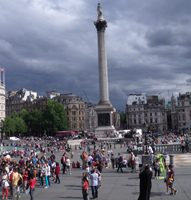In our October 2017 print issue, we featured an historical commercial security article about the ‘Stop the Seventy Tour’, the anti-apartheid protest against the South African cricket tour of England in 1970, that was cancelled at the last moment.
The protesters – led by the future Labour cabinet minister Peter Hain – had done much to disrupt a Springboks rugby tour of the British Isles in the winter of 1969-70, not only demonstrating noisily and violently inside and outside rugby grounds, but inside and outside the players’ hotels.
One enterprising well-dressed man even tricking the Springboks’ coach driver to vacate his seat, for the protester to chain himself to the wheel and drive away with the team from their Piccadilly hotel (until he collided with a post office van down the road).
The South African ambassador to Britain at the time was Dr Hendrik Luttig. Police files at the National Archives at Kew in west London show that Dr Luttig was a worried man in that spring of 1970; not so much for his own safety, but for members of his family, such as his daughter, who worked at a Dutch bank in Trafalgar Square in central London.
Worried about commercial security enough to call in the Met Police, who duly assigned close protection detectives to himself and his daughter; who was taken to work in the ambassadorial car, that had the number plate SA1. Police advised Dr Luttig that it was better that his daughter go around in a less conspicuous manner.
The moral of the story; how can people who are not especially skilled in protecting themselves be relied on to do commercial security, any more than anyone can know how to do good oral hygiene, if they are not a qualified dentist?
Commercial security importance
Just as in ignorance we may expose ourselves to risk through our risky behaviour – walking down a dark alley at night on the way home from the cinema rather than taking a marked taxi – so the public may have little or no idea of what a terror risk is, or what idea they do have comes from a Hollywood film.
Hence false alarms, and the cost in closed businesses, delayed trains and even evacuated town centres from bomb alerts, may be the price to pay for a vigilant population.
That security management is not a profession – in the sense that unlike the law, or medicine or dentistry or accountancy it does not have an agreed body of knowledge whose practitioners are made to hold to agreed standards of work, and if they do not they may be struck off – can mean that a security-risk survey is not like a survey for health and safety of premises.
That is done with the aim of compliance to health and safety law and regulations; the security surveyor can be – as one consultant put it to Professional Security – like a jazz player; that is, giving his personal interpretation, as there is no security equivalent to the Health and Safety Act 1974 to keep to.










